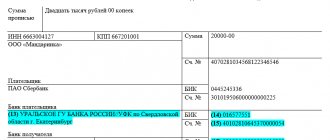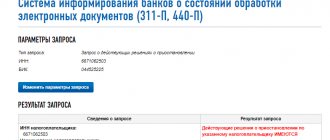Income tax
For individuals, that is, for you and me, this is income tax.
This is the main type of tax that individuals must pay on all types of income received during the year.
The tax rate for citizens whose annual income does not exceed 512 thousand rubles is 13%. That is, those who have higher incomes are required to pay 23%.
If you are an employee, your employer will transfer income tax to the relevant authorities for you. In all other cases (selling a car, real estate, renting out an apartment), the burden of paying tax on your income falls on you.
By April 1 of the year following the reporting year, it is necessary to fill out and submit an income declaration to the tax authority at the place of residence and pay the accrued tax amount by December 1.
Liability for non-payment
If you decide not to share the income received with the state, then you must be prepared for the fact that the state has response measures for this case:
- You decide not to file an income tax return - this will result in a penalty of 5% of the amount of tax payable from the date set for filing the return. If such a delay is more than 180 days, the fine will increase to 30%, and from 181 days 10% of the amount of taxes payable will be calculated for each full or partial month of delay . It should be remembered that information that you sold an apartment, land, car is received by the tax office from the authorities that participated in the registration of your transaction (notary, state registration authorities, traffic police).
- For paying taxes late, a penalty will be charged, which is calculated by multiplying the amount of tax debt by the number of days of delay and by 1/300 of the refinancing rate.
- The fine for violating the tax payment deadline is 20% of the unpaid tax amount. In addition, the tax office will find out whether you are intentionally evading tax or not. If evidence of deliberate evasion is obtained, the fine will increase to 40%.
Apartment rental tax
Nowadays, it is very common to receive both primary and additional income from renting an apartment.
If you rent out an apartment for a period of more than a year, then the rental agreement is subject to the state. registration. The tax rate on income received by an individual from renting an apartment is 13% and is calculated on the amount you received within 1 year (from January 1 to December 31). Let's look at this with a specific example: Citizen L. Rented out an apartment for a monthly fee of 10 thousand rubles. (including utility bills), starting from February to November 2021 inclusive. Thus, in 2016 she received an income of 100 thousand rubles. After receiving a declaration of income from citizen L. (by April 30 of the following reporting year, i.e. 2017), the tax office assessed a tax in the amount of 13 thousand rubles, which she must pay before December 1, 2021.
It should be noted that for foreigners renting out an apartment in the Russian Federation, the income tax will be 30%.
Liability for non-payment
Now let’s look at the problems that a citizen will have if he fails to pay tax on income received from renting out an apartment:
- First of all, if you have not filed a declaration of your income at all, then you have committed an offense. This is subject to a penalty of 5% of the amount of tax payable from the date established for submitting the declaration. If such a delay is more than 180 days, the fine will increase to 30%, and from 181 days 10% of the amount of taxes payable will be calculated for each full or partial month of delay.
- For paying taxes late, a penalty will be charged, which is calculated by multiplying the amount of tax debt by the number of days of delay and by 1/300 of the refinancing rate.
- The fine for violating the tax payment deadline is 20% of the unpaid tax amount. In addition, the tax office will find out whether you are intentionally evading tax or not. If evidence of deliberate evasion is obtained, the fine will increase to 40%.
Returning to our example with citizen L., it is easy to calculate that in the event of tax evasion for renting out an apartment, the amount that the tax inspectorate can collect will almost double.
Property tax
Property tax for individuals is assessed by the tax office, a notification is sent, to which a receipt for payment of the tax is immediately attached. Property taxes must be paid by December 1 of the following year. For example, you must pay property taxes calculated for 2021 by December 1, 2021. You are not required to pay the tax until you receive notice, which will be sent to you no later than 30 days before the due date.
Liability for non-payment
Non-payment or untimely payment of property tax for individuals is subject to liability:
- For paying taxes late, a penalty will be charged, which is calculated by multiplying the amount of debt by the number of days of delay and by 1/300 of the refinancing rate.
- The fine for violating the tax payment deadline is 20% of the unpaid tax amount. Intentional failure to pay tax will result in a fine of 40% of the tax due.
- 6 months after the expiration of the payment period for debt amounting to more than 3 thousand rubles. (including penalties and fines), the tax office may send documents to the court with a claim for collection, and your funds and property may be seized.
In addition, the tax authority may send a letter to your employer stating that you are not fulfilling your obligation to pay tax debt.
Reasons for holding legal entities accountable
Who is responsible before the law in organizations is indicated in internal documentation.
An employee who performed duties for a colleague who is on vacation will be held fully accountable before the law. Read also: How to draw up a reconciliation report
There are the following collection methods:
- fines;
- forced labor for up to 5 years;
- arrest;
- restriction of freedom up to 6 years;
- a fine for non-payment of personal income tax in the amount of 20% of the debt;
- deprivation of the opportunity to work in a leadership position.
More stringent measures apply to a group of people than to an individual.
Transport tax
The Tax Code of the Russian Federation stipulates that individuals who are owners of vehicles pay transport tax on the basis of a tax notice sent by the tax authority. Owning not all vehicles requires payment of transport tax.
Not subject to taxation:
- rowing boats, as well as low-power motor boats;
- low-power cars for disabled people received through social security authorities;
- fishing sea and river vessels;
- passenger and cargo sea, river and aircraft for passenger and cargo transportation;
- agricultural machinery;
- wanted vehicles;
The deadline for payment of transport tax is December 1 of the following reporting year. In this case, sending a tax notice is allowed no later than 30 days before the expiration of the payment deadline and no more than three tax periods preceding the calendar year of its sending. If you have not received a notice of tax payment, in order to avoid subsequent problems, you must contact the territorial tax authority and find out the situation.
Liability for non-payment
If the owner of a vehicle evades payment of transport tax or makes untimely payment, then the tax authorities have the right to apply the following sanctions to the violator:
- A penalty, which is calculated by multiplying the amount of debt by the number of days of delay and by 1/300 of the refinancing rate.
- The imposition of a fine for violation of the tax payment deadline is 20% of the unpaid tax amount. Willful failure to pay tax will result in a fine of 40% of the amount of tax due.
- Applying to the court to seize your money and property.
Case study . Citizen Ch., who owned a car, did not pay transport tax for more than four years, while regularly receiving notifications. In addition, the tax inspectorate sent citizen Ch. a demand for payment of tax arrears, and also assessed a penalty. Citizen Ch. ignored the demands of the tax inspectorate. After this, the tax inspectorate filed a lawsuit. By court decision, citizen Ch.’s car was seized. The bailiffs sold the car and, using the funds received, the tax debt, as well as penalties and fines for intentional tax evasion, were paid off.
Land tax
Land tax for individuals must be paid to land owners.
Land tax is a local tax, and its rate is set by municipal authorities. For individuals, land tax is calculated by the tax office. Every year, the tax office no later than 30 days before December 1 of the following year sends tax notices regarding the payment of land tax. You are not required to pay land tax until you receive such a document.
It should be noted that from 01/01/2015, individuals are required to report to the tax authority by December 31 of the year following the expired tax period about an object for which a tax notice was not received.
For example, citizen V. bought a plot of land in May 2015. If he does not receive a tax payment notice by November 1, 2021, he must inform the tax office by December 31, 2021 that he owns a land plot. Failure to do so may subsequently be considered tax evasion.
Liability for non-payment
Failure to pay land tax by individuals is an offense and is subject to liability:
- Accrual of penalties for late payment of tax, which is calculated by multiplying the amount of debt by the number of days of delay and by 1/300 of the refinancing rate;
- The imposition of a fine for violation of the tax payment deadline is 20% of the unpaid tax amount. Failure to pay tax will result in a 40% fine.
For example, if the amount of land tax is 8 thousand rubles, then the fine will be 1600 rubles, and for intentional actions - 3 thousand 200 rubles. Typically, if you received tax notices but ignored them, the tax office has grounds to charge you with intentional tax evasion.
It should be noted that the tax inspectorate can collect tax debts, penalties and fines from an individual only by a court decision.
If there is a court decision to collect tax debts, and it is not executed, then bailiffs, in order to ensure the execution of the court decision, can foreclose on the debtor’s wages, his property, and prohibit travel abroad.
How the tax base is understated
Read: Penalty for failure to submit documents at the request of the tax office
Let's look at how the VAT tax base is reduced. A number of entrepreneurs perform these actions intentionally in order to reduce the amount of tax paid, but for the majority, this is simply a consequence of errors in calculations. Typical ones include the following:
- The object of taxation is incorrectly established.
- The fact of the economic life of the entity, the results of which should be reflected in the amount of tax, was not taken into account in time.
- The same fact is taken into account twice.
- There are errors in the primary documentation.
If underestimation of the tax base occurs deliberately, then for those responsible, this can result in serious punishment, including criminal prosecution. As a rule, the director of the enterprise and the chief accountant are recognized as such.
Therefore, if an unintentional error was discovered within the company, it must be corrected as soon as possible.
According to the Tax Code of the Russian Federation, the taxpayer is given a legal opportunity to avoid punishment due to an underestimated tax base. To do this, you must first fully repay the total amount of the arrears, the amount of the accrued penalty, and then submit an updated declaration to the Tax Service.
In this case, simply transferring the underpaid amount will not do. This provision applies to all business entities and in particular those who calculate taxes according to the simplified tax system.
Criminal liability for non-payment of taxes by individuals
Failure to pay any type of tax by individuals may also result in the individual being brought to criminal liability for tax evasion (Article 198 of the Criminal Code of the Russian Federation).
Criminal liability for intentional non-payment of taxes occurs in the case of large (more than 600 thousand rubles) and especially large (more than 3 million rubles) amounts of tax debt.
The punishment under this article is quite severe. In addition to the criminal record you received, you will have to pay a fine from 100 thousand rubles to 300 thousand rubles. Arrest for a term of 4 to 6 months, or imprisonment for a term of up to one year is also possible. If the amount of arrears is particularly large, the fine increases to 200-500 thousand rubles. The term of imprisonment is increased to 3 years.
The state may release the debtor from criminal liability if the damage caused is fully repaid . In this case, even the criminal case initiated will be terminated. But this option is valid only once, since the person who commits a tax crime for the first time is exempt from criminal liability.
If you have any questions about non-payment of taxes by an individual, or you find yourself in an unpleasant situation with bailiffs, then our online duty lawyer is ready to advise you on this issue for free.
Responsibility of taxpayers and tax agents: basic components
Tax liability for taxpayers is mainly represented by the following items:
- Art. 116 of the Tax Code of the Russian Federation - violations in connection with registration;
- Art. 119 and 119.1 of the Tax Code of the Russian Federation - violations related to the submission of declarations;
About the fine under Art. 119 of the Tax Code of the Russian Federation covers this material .
- Art. 120 of the Tax Code of the Russian Federation - tax liability for violations related to accounting;
Read more about them here .
- Art. 122 of the Tax Code of the Russian Federation - non-payment of tax;
- Art. 123 of the Tax Code of the Russian Federation - an analogue of Art. 122 for tax agents;
- Art. 126 and 129.1 of the Tax Code of the Russian Federation - tax structures arising when requesting documents and information.





